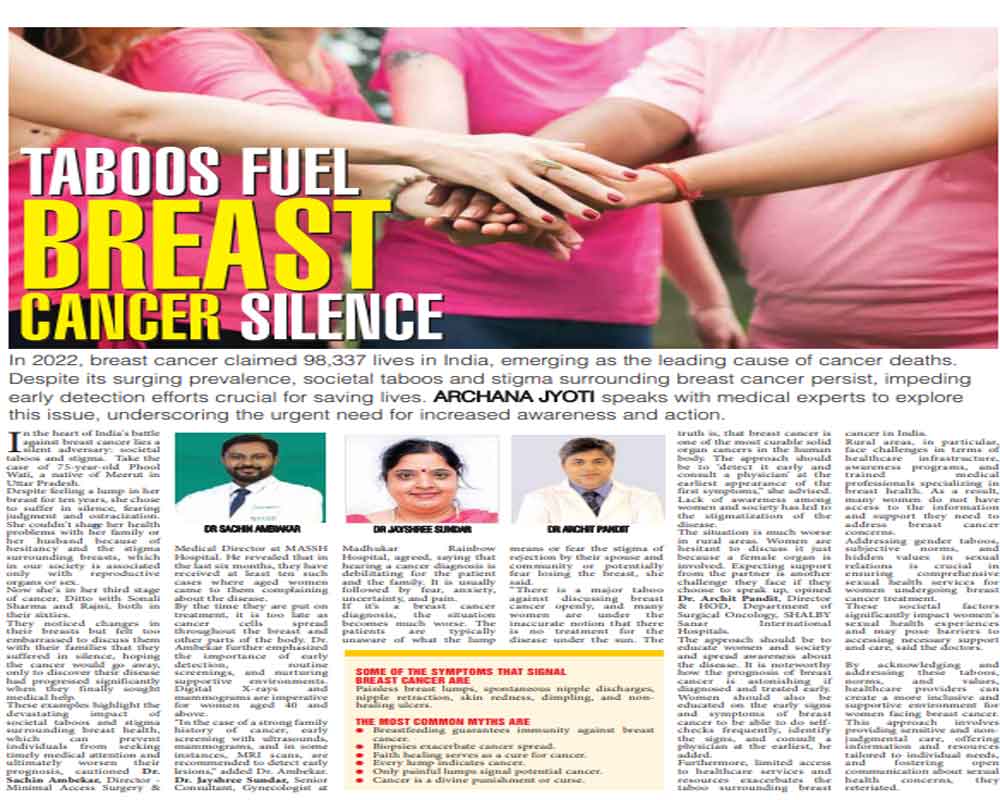In 2022, breast cancer claimed 98,337 lives in India, emerging as the leading cause of cancer deaths. Despite its surging prevalence, societal taboos and stigma surrounding breast cancer persist, impeding early detection efforts crucial for saving lives. ARCHANA JYOTI speaks with medical experts to explore this issue, underscoring the urgent need for increased awareness and action.
In the heart of India's battle against breast cancer lies a silent adversary: societal taboos and stigma. Take the case of 75-year-old Phool Wati, a native of Meerut in Uttar Pradesh.
Despite feeling a lump in her breast for ten years, she chose to suffer in silence, fearing judgment and ostracization. She couldn't share her health problems with her family or her husband because of hesitancy and the stigma surrounding breasts, which in our society is associated only with reproductive organs or sex.
Now she's in her third stage of cancer. Ditto with Sonali Sharma and Rajni, both in their sixties.
They noticed changes in their breasts but felt too embarrassed to discuss them with their families that they suffered in silence, hoping the cancer would go away, only to discover their disease had progressed significantly when they finally sought medical help.
These examples highlight the devastating impact of societal taboos and stigma surrounding breast health, which can prevent individuals from seeking timely medical attention and ultimately worsen their prognosis, cautioned Dr. Sachin Ambekar, Director - Minimal Access Surgery & Medical Director at MASSH Hospital. He revealed that in the last six months, they have received at least ten such cases where aged women came to them complaining about the disease.
By the time they are put on treatment, it is too late as cancer cells spread throughout the breast and other parts of the body. Dr. Ambekar further emphasized the importance of early detection, routine screenings, and nurturing supportive environments. Digital X-rays and mammograms are imperative for women aged 40 and above.
“In the case of a strong family history of cancer, early screening with ultrasounds, mammograms, and in some instances, MRI scans, are recommended to detect early lesions,” added Dr. Ambekar. Dr. Jayshree Sundar, Senior Consultant, Gynecologist at Madhukar Rainbow Hospital, agreed, saying that hearing a cancer diagnosis is debilitating for the patient and the family. It is usually followed by fear, anxiety, uncertainty, and pain.
If it’s a breast cancer diagnosis, the situation becomes much worse. The patients are typically unaware of what the lump means or fear the stigma of rejection by their spouse and community or potentially fear losing the breast, she said.
“There is a major taboo against discussing breast cancer openly, and many women are under the inaccurate notion that there is no treatment for the disease under the sun. The truth is, that breast cancer is one of the most curable solid organ cancers in the human body. The approach should be to ‘detect it early and consult a physician’ at the earliest appearance of the first symptoms,” she advised. Lack of awareness among women and society has led to the stigmatization of the disease.
The situation is much worse in rural areas. Women are hesitant to discuss it just because a female organ is involved. Expecting support from the partner is another challenge they face if they choose to speak up, opined Dr. Archit Pandit, Director & HOD, Department of Surgical Oncology, SHALBY Sanar International Hospitals.
The approach should be to educate women and society and spread awareness about the disease. It is noteworthy how the prognosis of breast cancer is astonishing if diagnosed and treated early. Women should also be educated on the early signs and symptoms of breast cancer to be able to do self-checks frequently, identify the signs, and consult a physician at the earliest, he added.
Furthermore, limited access to healthcare services and resources exacerbates the taboo surrounding breast cancer in India.
Rural areas, in particular, face challenges in terms of healthcare infrastructure, awareness programs, and trained medical professionals specializing in breast health. As a result, many women do not have access to the information and support they need to address breast cancer concerns.
Addressing gender taboos, subjective norms, and hidden values in sexual relations is crucial in ensuring comprehensive sexual health services for women undergoing breast cancer treatment.
These societal factors significantly impact women's sexual health experiences and may pose barriers to accessing necessary support and care, said the doctors.
By acknowledging and addressing these taboos, norms, and values, healthcare providers can create a more inclusive and supportive environment for women facing breast cancer. This approach involves providing sensitive and non-judgmental care, offering information and resources tailored to individual needs, and fostering open communication about sexual health concerns, they reteriated.
Some of the symptoms that signal breast cancer are painless breast lumps, spontaneous nipple discharges, nipple retraction, skin redness, dimpling, and non-healing ulcers.
The most common myths are
- Breastfeeding guarantees immunity against breast cancer.
- Biopsies exacerbate cancer spread.
- Faith healing serves as a cure for cancer.
- Every lump indicates cancer.
- Only painful lumps signal potential cancer.
- Cancer is a divine punishment or curse.


























